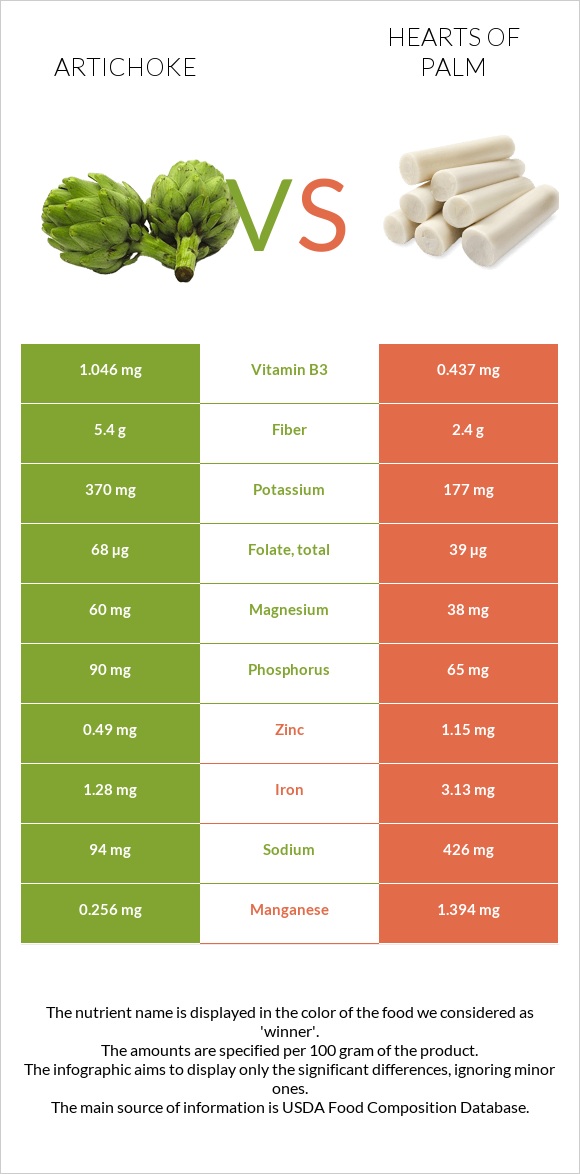Artichoke vs. Hearts of palm — In-Depth Nutrition Comparison
Compare
How are artichoke and hearts of palm different?
- Artichoke is richer in fiber, copper, folate, vitamin B6, potassium, and magnesium, while hearts of palm are higher in manganese, iron, and zinc.
- Hearts of palm cover your daily need for manganese, 49% more than artichoke.
- Artichoke contains 5 times more vitamin B6 than hearts of palm. Artichoke contains 0.116mg of vitamin B6, while hearts of palm contain 0.022mg.
- Artichoke is lower in sodium.
Artichokes, (globe or french), raw and Hearts of palm, canned types were used in this article.
Infographic

Infographic link
Mineral Comparison
Mineral comparison score is based on the number of minerals by which one or the other food is richer. The "coverage" charts below show how much of the daily needs can be covered by 300 grams of the food.
| Contains more MagnesiumMagnesium | +57.9% |
| Contains more PotassiumPotassium | +109% |
| Contains more CopperCopper | +73.7% |
| Contains more PhosphorusPhosphorus | +38.5% |
| Contains less SodiumSodium | -77.9% |
| Contains more CalciumCalcium | +31.8% |
| Contains more IronIron | +144.5% |
| Contains more ZincZinc | +134.7% |
| Contains more ManganeseManganese | +444.5% |
| Contains more SeleniumSelenium | +250% |
Vitamin Comparison
Vitamin comparison score is based on the number of vitamins by which one or the other food is richer. The "coverage" charts below show how much of the daily needs can be covered by 300 grams of the food.
| Contains more Vitamin CVitamin C | +48.1% |
| Contains more Vitamin AVitamin A | +∞% |
| Contains more Vitamin EVitamin E | +∞% |
| Contains more Vitamin B1Vitamin B1 | +554.5% |
| Contains more Vitamin B2Vitamin B2 | +15.8% |
| Contains more Vitamin B3Vitamin B3 | +139.4% |
| Contains more Vitamin B5Vitamin B5 | +168.3% |
| Contains more Vitamin B6Vitamin B6 | +427.3% |
| Contains more Vitamin KVitamin K | +∞% |
| Contains more FolateFolate | +74.4% |
All nutrients comparison - raw data values
| Nutrient |  |
 |
DV% diff. |
| Manganese | 0.256mg | 1.394mg | 49% |
| Iron | 1.28mg | 3.13mg | 23% |
| Sodium | 94mg | 426mg | 14% |
| Fiber | 5.4g | 2.4g | 12% |
| Vitamin K | 14.8µg | 12% | |
| Copper | 0.231mg | 0.133mg | 11% |
| Vitamin B6 | 0.116mg | 0.022mg | 7% |
| Folate | 68µg | 39µg | 7% |
| Potassium | 370mg | 177mg | 6% |
| Zinc | 0.49mg | 1.15mg | 6% |
| Choline | 34.4mg | 6% | |
| Magnesium | 60mg | 38mg | 5% |
| Vitamin B1 | 0.072mg | 0.011mg | 5% |
| Vitamin C | 11.7mg | 7.9mg | 4% |
| Phosphorus | 90mg | 65mg | 4% |
| Vitamin B3 | 1.046mg | 0.437mg | 4% |
| Vitamin B5 | 0.338mg | 0.126mg | 4% |
| Protein | 3.27g | 2.52g | 2% |
| Carbs | 10.51g | 4.62g | 2% |
| Calories | 47kcal | 28kcal | 1% |
| Fats | 0.15g | 0.62g | 1% |
| Calcium | 44mg | 58mg | 1% |
| Vitamin E | 0.19mg | 1% | |
| Selenium | 0.2µg | 0.7µg | 1% |
| Vitamin B2 | 0.066mg | 0.057mg | 1% |
| Polyunsaturated fat | 0.064g | 0.202g | 1% |
| Net carbs | 5.11g | 2.22g | N/A |
| Sugar | 0.99g | N/A | |
| Vitamin A | 1µg | 0µg | 0% |
| Saturated fat | 0.036g | 0.13g | 0% |
| Monounsaturated fat | 0.005g | 0.103g | 0% |
| Tryptophan | 0.023mg | 0% | |
| Threonine | 0.097mg | 0% | |
| Isoleucine | 0.101mg | 0% | |
| Leucine | 0.169mg | 0% | |
| Lysine | 0.091mg | 0% | |
| Methionine | 0.042mg | 0% | |
| Phenylalanine | 0.098mg | 0% | |
| Valine | 0.114mg | 0% | |
| Histidine | 0.055mg | 0% |
Macronutrient Comparison
Macronutrient breakdown side-by-side comparison
Protein:
3.27 g
Fats:
0.15 g
Carbs:
10.51 g
Water:
84.94 g
Other:
1.13 g
Protein:
2.52 g
Fats:
0.62 g
Carbs:
4.62 g
Water:
90.2 g
Other:
2.04 g
| Contains more ProteinProtein | +29.8% |
| Contains more CarbsCarbs | +127.5% |
| Contains more FatsFats | +313.3% |
| Contains more OtherOther | +80.5% |
~equal in
Water
~90.2g
Fat Type Comparison
Fat type breakdown side-by-side comparison
Saturated fat:
Sat. Fat
0.036 g
Monounsaturated fat:
Mono. Fat
0.005 g
Polyunsaturated fat:
Poly. Fat
0.064 g
Saturated fat:
Sat. Fat
0.13 g
Monounsaturated fat:
Mono. Fat
0.103 g
Polyunsaturated fat:
Poly. Fat
0.202 g
| Contains less Sat. FatSaturated fat | -72.3% |
| Contains more Mono. FatMonounsaturated fat | +1960% |
| Contains more Poly. FatPolyunsaturated fat | +215.6% |




